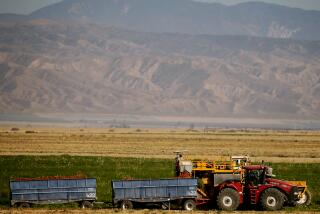THE CALIFORNIA DROUGHT : Cut Water to Farmers, State Urged : Agriculture: Congressman says some growers who receive federal supplies may sell it at a huge profit. Rice producers should be a target of cutoff, he says.
WASHINGTON — The acting chairman of the House Interior Committee has urged a California state agency to block massive deliveries to farmers of water from the federally operated Central Valley Project.
In a letter released Sunday, Rep. George Miller (D-Martinez) argued that the State Water Resources Control Board, which already has decided to cut off all water to farmers under its domain, also has authority to suspend federal deliveries in the current drought emergency.
U. S. Interior Secretary Manuel Lujan Jr. already has rejected a plea from Miller to halt federal farm deliveries, contending it was neither legal nor warranted. However, Miller contends that the state water board has the power to overrule the Interior Department and stop the flow from the federally operated project.
Miller claims the water is critically needed for other purposes--such as preserving supplies for 10 million urban dwellers, protecting fish and wildlife and maintaining drinking water standards that are in danger of being lowered in the Sacramento-San Joaquin Delta, part of Miller’s district.
Even if farmers do not use the water for irrigation, the congressman told the state board, they stand to reap windfall profits by reselling their federal supplies to the state.
“Farmers who pay as little as $2 an acre-foot for this water intend to sell it to the State Water Bank for as much as $300 to $400 an acre-foot,” he said. “Therefore, permitting the (U. S. Bureau of Reclamation) to deliver water to these federal contractors . . . will either substantially deplete carryover water supplies, or will cost taxpayers hundreds of millions of dollars in repurchase costs.”
Miller called for halting all deliveries except in cases of severe hardship where fruit trees or grapevines are imperiled. He said rice growers should be a prime target for cutoffs because they have a “low-value, water-intensive crop.”
Miller contended that the state water agency could suspend deliveries under contract provisions dealing with “acts of God” emergencies, “such as a five-year drought.” He said the board had exercised similar authority during a much less severe dry spell in 1977-78.
The Interior Department announced on Feb. 14 that it would reduce Central Valley Project water deliveries to most farmers in the state to 25% of the normal amount.
However, a minority of other farmers who hold Sacramento River water rights or are San Joaquin River exchange contractors would get 75% of normal deliveries under the federal plan.
Miller complained that this group, most of them rice growers, would get about 2.2 million acre-feet of water while farmers served by the State Water Project would get no water at all.
“What we’re trying to do is get the federal government not to release the water so that it can be held in storage for more diverse users if the drought continues next year,” the congressman said in an interview. “Otherwise, the system will essentially run dry.
“But nobody,” he said, “wants to step on the toes of a few rice farmers” who “just want to shake down the government” in reselling their federal water to the state. He called them a “historically well-connected group” that “got Congress to turn around on an embargo of (Iraqi President) Saddam Hussein just before he invaded Kuwait, for crying out loud.”
Miller said he was referring to House votes last summer that originally cut off commodity credits for Iraq, then restored them “after rice interests lobbied the White House.”
Representatives of California’s two rice grower associations could not be reached for comment, but a lobbyist for other California farm interests said that Miller’s account of the House actions was simplistic.
“The debate was mostly over the sanctity of contracts affecting many commodities,” said the lobbyist, who asked not to be identified.
In a related drought development, Rep. Robert T. Matsui (D-Sacramento) protested a federal ruling that, he said, may deny federal crop insurance to California farmers who suffer losses this year due to irrigation cutbacks.
Matsui said the Federal Crop Insurance Corp. had sent farmers a statement saying: “Any failure of the irrigation water supply for the 1991 crop year will not be the result of an uncontrollable natural event during the insurance period.”
The congressman interpreted this as “nothing less than a breach of contract. Farmers are going to have a difficult enough time this year with the freeze, and now they are being told that Federal Crop Insurance is washing its hands of any responsibility to assist them with the drought.
“If FCIC won’t help out with a five-year drought,” he said “when will it?”
Matsui said the policy was handed down in a letter to growers Feb. 12, nearly two weeks after the deadline for them to enroll in the crop insurance program for 1991.
He asked for an investigation by the House Agriculture Committee and the General Accounting Office, Congress’ auditing arm.
FCIC officials could not be reached for comment Sunday.
More to Read
Sign up for Essential California
The most important California stories and recommendations in your inbox every morning.
You may occasionally receive promotional content from the Los Angeles Times.










